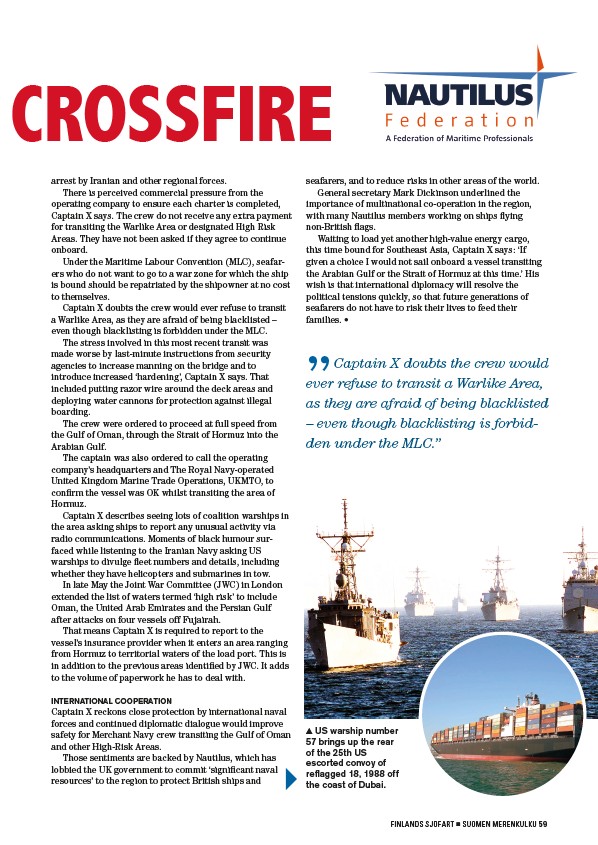
” Captain X doubts the crew would
ever refuse to transit a Warlike Area,
as they are afraid of being blacklisted
– even though blacklisting is forbid-den
under the MLC.”
FINLANDS SJÖFART J SUOMEN MERENKULKU 59
THE CROSSFIRE
arrest by Iranian and other regional forces.
There is perceived commercial pressure from the
operating company to ensure each charter is completed,
Captain X says. The crew do not receive any extra payment
for transiting the Warlike Area or designated High Risk
Areas. They have not been asked if they agree to continue
onboard.
Under the Maritime Labour Convention (MLC), seafar-ers
who do not want to go to a war zone for which the ship
is bound should be repatriated by the shipowner at no cost
to themselves.
Captain X doubts the crew would ever refuse to transit
a Warlike Area, as they are afraid of being blacklisted –
even though blacklisting is forbidden under the MLC.
The stress involved in this most recent transit was
made worse by last-minute instructions from security
agencies to increase manning on the bridge and to
introduce increased ‘hardening’, Captain X says. That
included putting razor wire around the deck areas and
deploying water cannons for protection against illegal
boarding.
The crew were ordered to proceed at full speed from
the Gulf of Oman, through the Strait of Hormuz into the
Arabian Gulf.
The captain was also ordered to call the operating
company’s headquarters and The Royal Navy-operated
United Kingdom Marine Trade Operations, UKMTO, to
confirm the vessel was OK whilst transiting the area of
Hormuz.
Captain X describes seeing lots of coalition warships in
the area asking ships to report any unusual activity via
radio communications. Moments of black humour sur-faced
while listening to the Iranian Navy asking US
warships to divulge fleet numbers and details, including
whether they have helicopters and submarines in tow.
In late May the Joint War Committee (JWC) in London
extended the list of waters termed ‘high risk’ to include
Oman, the United Arab Emirates and the Persian Gulf
after attacks on four vessels off Fujairah.
That means Captain X is required to report to the
vessel’s insurance provider when it enters an area ranging
from Hormuz to territorial waters of the load port. This is
in addition to the previous areas identified by JWC. It adds
to the volume of paperwork he has to deal with.
INTERNATIONAL COOPERATION
Captain X reckons close protection by international naval
forces and continued diplomatic dialogue would improve
safety for Merchant Navy crew transiting the Gulf of Oman
and other High-Risk Areas.
Those sentiments are backed by Nautilus, which has
lobbied the UK government to commit ‘significant naval
resources’ to the region to protect British ships and
A
seafarers, and to reduce risks in other areas of the world.
General secretary Mark Dickinson underlined the
importance of multinational co-operation in the region,
with many Nautilus members working on ships flying
non-British flags.
Waiting to load yet another high-value energy cargo,
this time bound for Southeast Asia, Captain X says: ‘If
given a choice I would not sail onboard a vessel transiting
the Arabian Gulf or the Strait of Hormuz at this time.’ His
wish is that international diplomacy will resolve the
political tensions quickly, so that future generations of
seafarers do not have to risk their lives to feed their
families. •
G US warship number
57 brings up the rear
of the 25th US
escorted convoy of
reflagged 18, 1988 off
the coast of Dubai.